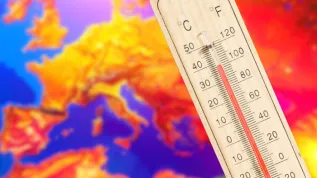
Less than a tenth of Poles (8%) are climate change deniers, 68% of respondents feel concern for their own and their relatives' lives, and 67% believe that climate change affects them personally, according to the latest State of Science Index, which presents the attitude of people to environmental protection.
State of Science Index is commissioned by 3M and conducted in 17 countries. It explores global attitudes toward science, technology and the environment. The latest edition, carried out in Poland by Ipsos for 3M, in which 1,003 adult Poles took part via online surveys, shows, among other things, that people in Poland believe in climate change and have a personal attitude towards it.
However, 8% adult Poles do not believe that the climate is changing. It is similar in France, the UK, Germany and Canada.
One-third of Poles are not afraid of having to change their place of residence because of the weather, but as many as 68 percent respondents feel concern for their own and their relatives' lives.
67 percent of those who believe in climate change also believe that it affects them personally, and 25 percent declare that it does not affect their daily life.
Poles also try to lessen the effects of climate change. More than half of them reduce water consumption, less than 50% try to use less plastic, and 45% respondents use energy-saving devices.
In other countries, on the other hand, plastic use reduction is in the first place.
The inhabitants of some industrialized countries invest surprisingly little in energy-efficient appliances.
This applies to the UK (26%), France (28%), and Germany (32%).
Polish residents also often use public transport (37%), but relatively rarely use an environmentally friendly vegan diet (17%).
They also support the introduction of more systemic solutions, and even restrictions.
Almost half of Poles believe that energy from renewable sources should be used to power public buildings. The same number supports creating parks and gardens.
As many as 42% are in favour of imposing limits on water consumption.
Meanwhile, two times smaller percentage of French and British, and much smaller percentage of Italians and Germans want to save water.
The interviewers also asked the respondents for their opinion on the climate responsibility of companies.
More than half of Poles believe that companies should use less plastic in their products and reduce the amount of water they use.
53% also suggest the use of renewable energy sources, 52% - recycling, and 51% - reducing the amount of waste.
Meanwhile, for example, in the UK only 36% respondents believe that companies should reduce the amount of water used in production.
The inhabitants of Poland often believe that the solution to problems may come from new technologies.
60% believe that the key should be work on renewable energy sources, 58% would focus on methods of removing waste from production.
Slightly fewer emphasise the need to create new ways of reducing greenhouse gas emissions and monitoring air pollution.
53% would welcome a technology that protects against extreme weather.
'The results of the State of Science Index clearly show that the environmental awareness among Poles has increased significantly. Importantly, our expectations have also become clearer. Renewable energy, lower water consumption, more green spaces, reduction of CO2 emissions... These are selected areas that we perceive as important for us and for the environment in which we live. It is also a challenge and commitment for local governments and the private sector, which have to take more and more active steps and adapt long-term strategies to respond to climate challenges and the expectations of residents and consumers', says Mariusz Wawer, Head of Governmental Relations & Sustainability (ESG) at 3M East Europe Region.
When asked about what was stopping them you from doing more to lessen the effects of climate change, the respondents mainly say that sustainable products are too expensive (43%), that they do not see people around them taking action (27%) and that they do not know how to do it (24%). One-fifth of respondents (21%) believe that their behaviour will not make a difference for the environment, 16% admit that they have no time for this, 8% believe that the environment will fix itself.
Among Europeans, the lack of knowledge on how to care for the environment is also visible in Italy (27%), France (26%), the UK (24%) and Germany (23%). (PAP)
Marek Matacz
mat/ agt/ kap/
tr. RL













